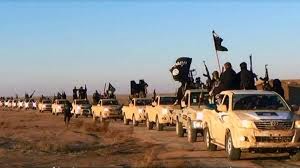WASHINGTON — Maj. Gen. Michael K. Nagata, commander
of American Special Operations forces in the Middle East, sought help this
summer in solving an urgent problem for the American military: What makes the
Islamic State so dangerous?
Trying to decipher this complex enemy — a hybrid
terrorist organization and a conventional army — is such a conundrum that
General Nagata assembled an unofficial brain trust outside the traditional
realms of expertise within the Pentagon, State Department and intelligence
agencies, in search of fresh ideas and inspiration.
Business professors, for
example, are examining the Islamic State’s marketing and branding strategies.
“We do not understand the movement, and until we do,
we are not going to defeat it,” he said, according to the confidential minutes
of a conference call he held with the experts. “We have not defeated the idea.
We do not even understand the idea.”
General Nagata’s frustration is shared by other
American officials. Even as President Obama and his top civilian and military
aides express growing confidence that Iraqi troops backed by allied airstrikes
have blunted the Islamic State’s momentum on the ground in Iraq and undermined
its base of support in Syria, other officials acknowledge they have barely made
a dent in the larger, longer-term campaign to kill the ideology that animates
the terrorist movement.
Four months after his initial session with the
outside advisers, General Nagata, one of the military’s rising stars and the
man Mr. Obama has tapped to train a Pentagon-backed army of Syrian rebels to
fight the Islamic State, is still searching for answers.
“Those questions and observations are my way of
probing and questioning,” General Nagata said in a brief email this month,
declining on orders from his superiors to say any more.
The minutes of internal conference calls between
General Nagata and more than three dozen experts he convened through Pentagon
channels in August and October offer an unusual insight into the struggle to
understand the Islamic State as a movement, and where the American military’s
top leaders are most focused.
One of the panel’s initial observations that has
intrigued General Nagata is the Islamic State’s “capacity to control” a
population, according to the minutes.
It is not so much the number of troops or types of
weapons the militants use, the experts said. Rather, it is the intangible means
by which the Islamic State, also called ISIS or
ISIL, wrests and maintains control over territory and its people.
This ability, they discussed, centers on
“psychological tactics such as terrorizing populations, religious and sectarian
narratives, economic controls.”
The minutes reveal disagreements among the experts
over whether ISIS’ main objective is ideological or territorial — General
Nagata encourages competing views, urging the group to have “one hell of a
debate” over his questions.
But the panel raised doubts whether ISIS “has the
bureaucratic sophistication necessary to govern.”
“The fact that someone as experienced in
counterterrorism as Mike Nagata is asking these kind of questions shows what a
really tough problem this is,” said Michael T. Flynn, a retired three-star Army
general and former director of the Defense Intelligence Agency who has publicly
raised similar concerns.
A final report by the group, which draws from
industry, academia and policy research organizations, is due next month.
How to defang the Islamic State’s enticing narrative
weighs heavily on many other senior administration officials, as well as top
leaders in the Middle East and Europe.















